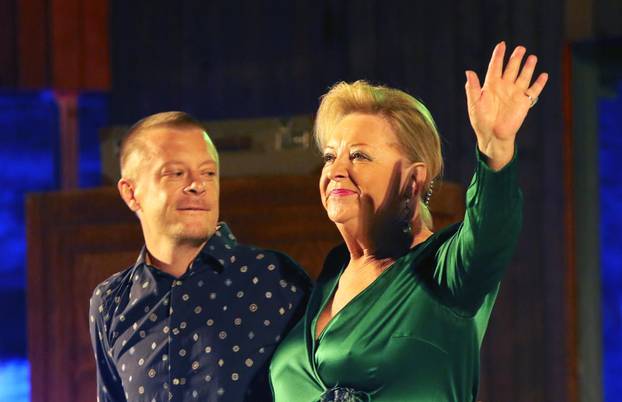« Voting rights are seriously limited »

State lawyer Paul Richli: « The people’s voting rights is seriously limited »
If Switzerland does not take over EU law, Brussels can impose punishment against Bern. The new EU contracts provide for this. Paul Richli, emeritus professor of public law, says what that means for direct democracy.
In the summer, the Federal Council starts consultation for the EU contracts. Paul Richli, emeritus professor of public law and once Vice Director of the Federal Office of Justice, has written a statement from a constitutional perspective, which is very important in political circles. It is about questions like: What does it mean for direct democracy that Brussels can impose so-called compensation measures if the people are against the assumption of EU law? Should the further development of bilateral contracts be subordinate to the stand or not? In the interview in a small meeting room at the University of Lucerne, which he used to be a director, 79-year-old Richli explains his arguments.
Paul Richli, wage protection and a protective clause to limit immigration dominates the debate about the EU contracts. Their effects on democracy are much less present. Is that surprising?
No. I understand that. Wage protection is a legitimate concern that affects people directly. The same applies to immigration. Switzerland has grown strongly and the shortage of skilled workers remains. People experience density stress in trains and on the streets, the living space is scarce. I do not make a political assessment of wage protection or immigration. But I understand that these aspects are more concerned with most people than institutional questions such as whether the EU contracts should only be subordinate to folk or constitution.
Exactly on this topic you have one on your own drive opinion written. What motivated you?
I have always been devoting myself to academic research, but I am also taking care of important, current constitutional questions. The topic of mandatory referendum yes or no came up after the Federal Council had passed the provisional negotiation mandate at the end of 2023.
At that time Astrid Epiney, professor of European law, said in one interview With the “NZZ am Sonntag”, in the constitution there is nothing of a mandatory referendum, this question is unnecessary. Agreed?
In fact, there is no direct basis for a double more in the Federal Constitution. The question is whether you can not say after the so-called “Sui-Generis practice”: the team is not mandatory, but an option.
Sui Generis means: If you have any questions, the Federal Council and Parliament can decide on the mandatory referendum, as happened in 1920 when joining the Völkerbund, 1972 at the free trade agreement with the EU and in 1992 at the EEA.
In these cases, politics came to the conclusion of assuming the templates to the stand, although it was not mandatory. The Sui-Generis practice has also developed in addition to the constitution.
Four years ago, however, the parliament did not enter into a template that wanted to write this practice in the constitution. This is also why the Federal Office of Justice states in an expert opinion that only the optional referendum is possible for the EU contracts. Is it wrong?
The fact that the parliament could not agree on a wording for the generalization of the SUI-generis practice does not mean that it has given up for the individual case. In the debate there were clearly more votes for maintaining the Sui-Generis practice than against it.
What does that mean?
The reasoning of the Federal Office for Justice is not convincing. From the non-entry to a generalization template, you cannot derive a ban on SUI-generis practice in exceptional cases. The parliament did not vote on this question. This means that it can still decide in individual cases the mandatory referendum. The EU contracts undoubtedly have an extraordinarily high scope. They are also the same as a substantive change. They limit the competencies of the parliaments and governments at the federal and cantons level and also limit the free voting rights of the citizens in the federal government and the cantons guaranteed in the constitution.
What we would have reached for the dynamic legal transfer. If Switzerland does not adopt EU law, Brussels can impose sanctions, so-called compensation measures. Does that change the democratic DNA of Switzerland?
Yes. This limits the people’s voting rights, in particular free opinion formation, in a serious manner because the compensation measures such as a sword of Damocles float over the decision. The competencies of parliaments and governments at the federal and cantonal level are also circumcised. EU law can still be rejected, but after that there can be compensation measures which specific advantages of the agreements can destroy. Cantonal skills are also affected, especially in the area of energy, traffic and subsidies. Imagine that Parliament would decide, the voters can take a referendum on a federal law. But if the referendum is successful, compensation measures are taken, for example subsidies are lifted, and without further referendum. So the people cannot vote freely. A different development is also underestimated.
Namely?
We do not know in which direction the EU and the case law of the European Court of Justice develop. This is a black box. For example, it is conceivable that cantonal tax sovereignty will get under the bikes.
The simple more was sufficient for bilateral I and II. Switzerland must take over Schenergenrecht. What should be so fundamentally different with the new EU contracts?
In contrast to the provided package, the bilateral I and II are static. This also applies to Schengen, the only contract in which Switzerland has to dynamically adapt EU law. Switzerland can say no there without the risk of compensation measures.
Switzerland is already taking over a large part of EU law. Absolute sovereignty is an illusion.
Naturally. But in the current legal situation, we can still voluntarily decide where we do without sovereignty or not. This is legally the big difference.
With the new contracts, Switzerland can at least call an arbitration court that checks the EU’s compensation measures for proportionality.
That’s correct. But it remains the possibility of compensation that cleans the advantages of the contract in case. For the arbitration tribunal, the interpretation of EU law by the European Court of Justice is binding. In addition, we can take countermeasures under today’s regime if the EU gives us needles, as with the stock exchange equivalence. This is no longer possible with the new contract.
Doesn’t US President Donald Trump be a closer cooperation with the EU in view of the customs policy?
This is a (too) short -term perspective. If the people vote on the EU contracts, President Trump may not even have a majority in the House of Representatives. In the past, the EU has not always proven to be a reliable partner. Switzerland’s exclusion from the research program was legally problematic. Incidentally, part of the EU democracies no longer seems as stable and reliable as already. This may significantly strike the EU and makes it less predictable. In addition, there is the widespread flood of regulations criticized by the economy.
The problem is: The existing bilateral contracts gradually in value without updating, and Switzerland threatens to lose free access to the internal market.
So far it is not clear how big the economic disadvantages are in the long run. For example, Switzerland also has to adapt to an ever increasing Swiss franc. Perhaps we can compensate for the losses by growing in other markets, for example thanks to other free trade agreements. In any case, gradual erosion is a smaller problem as a short -term massive customs loading. What I would like to say: Which economic consequences have a no to the new EU contracts can (until now) predict exactly. The legal consequences for the competence regulations and voting rights, on the other hand, can be better estimated.
This means that citizens have to decide what they weight more: the sovereignty of the country or alleged economic advantages of EU contracts?
Exactly.
In which direction do you tend?
As a constitutional lawyer, I am clear for a double more. As a citizen, I would like to pursue the discussion even more. In this regard, I find that well -known economists and parts of the economy are skeptical. However, I understand that there are fellow citizens who, at the current state of knowledge, have the economic arguments more than the legal weights.
Why should the voice of a urner have 40 times more weight than that of a Zurich woman with such an important question?
The two -chamber system was the prerequisite for creating the state after the special federal war. Without the strong position of the cantons with the state, modern Switzerland would not exist. If we want to change this, we have to change the constitution. One could consider, for example, to grant the larger cantons more seats than the smaller ones given the demographic development in the Council of States. In addition, there is also a massive gradation of the participation of the Member States in the EU. For example, Malta with 550,000 inhabitants has a commissioner, just like Germany with 83 million. There is also a large privilege of the small Member States and their population in the European Parliament.
Do you become politically captured by EU skeptics?
No. I am asked – not only in the present context – from time to time for participation in committees. I consistently reject that. I outdo myself as a legal scientist and publish my analyzes or answer legal questions. When asked about the question, I come to the conclusion: from a legal perspective, more speaks for a double than for a simple more.
Where do you locate politically?
I am a liberal, independent spirit that was never a member of a party.







